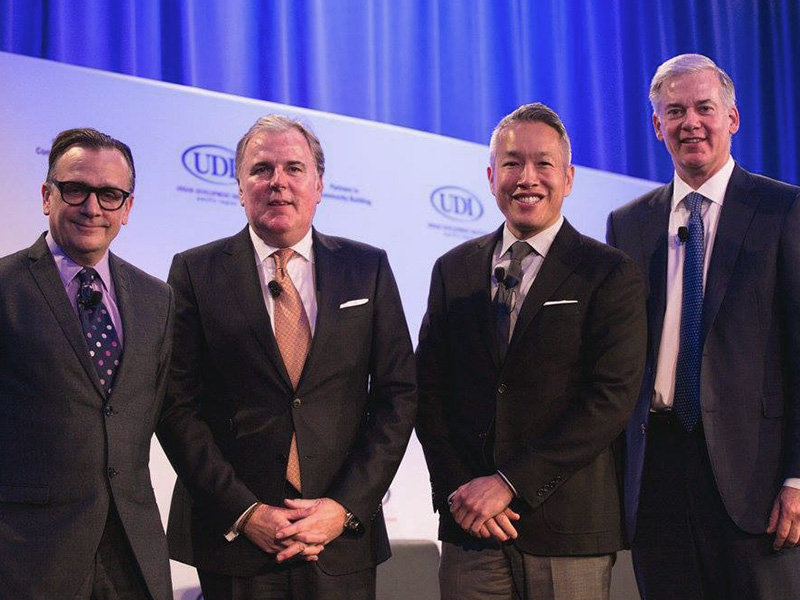Developers Dive into 2018 with Nervous Optimism
A recap of the 2018 UDI Forecast Luncheon held in Vancouver on January 18th, 2018.

A sold-out crowd of over 1,200 UDI members packed the ballroom of the Vancouver Hyatt Hotel on January 18th for the annual Forecast Luncheon, where a panel of several of Vancouver’s most prominent development figures offered their insights on what 2018 might look like for the region’s real estate market.
Jon Stovell of Reliance Properties returned as moderator of the panel of speakers that included Kevin Layden (Wesbild Holdings), Todd Yuen (Beedie) and Ward McAllister (Ledingham McAllister Properties), each of whom brought unique – and often humorous – insights to the table.

At last years function, the keynote speakers made several – mostly bullish – predictions that turned out to underestimate market performance, particularly on the residential side of the business. Nobody could have predicted the meteoric price gains and dearth of available product that shaped the landscape of the Vancouver real estate market last year. As such, the main question on attendee’s minds this year was whether the party would continue in 2018.
Clearly mindful of their audience’s apprehensions, all speakers shared a reserved yet optimistic outlook for the year ahead. The cautionary aspect of their message was driven by a common set of concerns including the looming possibility of rising interest rates, more stringent mortgage qualification criteria, and of course the new Provincial Government’s mandate to dampen speculation and increase affordability. The panelists shared a mutual acceptance of key fundamentals that will continue to fuel the market in 2018, most notably that demand for well positioned real estate – especially residential and industrial – far outstrips the available supply, and barring any major changes this should continue to be the case. Additionally, the general sentiment among the panelists is that the most recent iteration of the provincial NDP government will be more moderate – if not considerably so – than their predecessors.
Kevin Layden’s opening comments were guided by a forward-looking perspective about being on “the right side of history” when it comes to potential changes and challenges on the immediate horizon. Citing previous experiences with not only the importance of recognizing change in business, but also the rate at which it can occur, Layden went on to give several examples of how technology has fundamentally altered the merchant business in recent years. While these changes have been disruptive, they do present unique opportunities for both business people and policymakers that are keen enough to notice. Layden then went on to highlight the important distinction between change leadership and change management. He mused that while change management is more like following step by step directions on a map, change leadership is akin to a compass. He used this important distinction to encourage policy makers to make a concerted effort to understand the increasingly global context of the Vancouver real estate market and to use their compass to “lead and be on the right side of change” before implementing protectionist policies in the housing market.
Todd Yuen of Beedie offered an optimistic forecast for the industrial sector heading into 2018. While it doesn’t yet receive the same level of public attention as commercial or residential development, he said, the impact of industrial development effects the local economy tremendously and will continue to do so as more and more transactions continue to take place online, increasing the need for well located warehouses and distribution hubs.
Mr. Yuen went on to highlight that while the increase in demand for industrial space has been good for business, mentioning that Vancouver has one of the strongest and most expensive industrial markets in the world, it has created a specific set of challenges that will need to be overcome to satisfy the needs of future commerce. “The days of industrial existing in the shadows (are) over” he prophesized. Encouraging a collaborative approach between all levels of government, Mr. Yuen concluded his comments with hopes that 2018 will be a “turning point” for industrial real estate development in British Columbia, as constraints in demand and pricing force local and provincial governments to realize that without radical shifts in both policy and overall attitude, the industrial real estate market will run out of land and be unable to meet the needs of the economy.
Ward McAllister‘s residential forecast focused on both the challenges and opportunities that could impact the market over the next 12 months. Citing commonly held concerns over increasing interest rates, new mortgage qualification rules, rising construction costs, escalating land prices, land scarcity, a new provincial government, as well as broad-based global concerns, McAllister’s laundry list of potential pitfalls was certainly troubling. However, he continued, when juxtaposed with the opportunities that will be afforded to the local market, as well as a continued focus on economic fundamentals (particularly supply vs demand), these threats should be viewed as somewhat less concerning. Immigration, Mr. McAllister said, would continue to be a main driver of demand, putting further pressure on the already depleted supply of standing inventory. Mr. McAllister concluded by imploring the new provincial government to make responsible decisions when it comes to the Vancouver housing market and to consult with the local experts before implementing policies that could cause the market, and presumably the provincial economy, to tumble.
Following the opening forecasts, an in-depth discussion and question period took the panelists on a deep dive into many of the topics covered in their preceding forecasts.
Click the link HERE for video coverage of the whole event.
